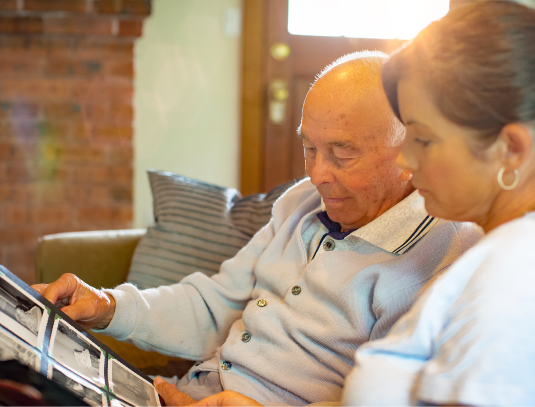“When my loved one received their diagnosis, it felt like everything in the world came to a screeching halt. Every plan made for the future was wiped out before I had the chance to process what was being laid out before me. From the moment I was told my loved one was diagnosed with a progressive and fatal disease, I began to grieve – both for the present and for the future.”
– anonymous caregiver.
Is It Possible to Grieve for Someone Who Hasn’t Passed Away?

Grief is never a linear process. Instead, it’s a messy, confusing, and emotional rollercoaster, constantly changing from one day to the next. As a caregiver, you might find yourself asking questions like, “Is this a real loss? Should I even be feeling this way? Is it possible to grieve for someone who hasn’t passed away?”
The answer to each of these questions is simple: yes.
Yes, you are dealing with a real loss. Yes, you do have a right to be feeling everything that you are. And yes, it is possible to grieve someone who is still physically present.
Grief doesn’t just come after your loved one has passed away. From the moment a diagnosis has been given, everything changes, and, suddenly, absence and presence are coexisting in a dynamic where, as a caregiver, you’re watching the progression of your loved one’s disease lead them down paths they’ve never been down before. They start acting in ways they might never have acted before. They say things that they would never have said in the past. They become someone you may have a hard time recognizing as the person you once knew.
Ambiguous Loss and Dementia
We know none of these things changes the love you have for your loved one, but it also does not mean you can not mourn over who they were before their diagnosis or the plans you had laid out together.
Ambiguous loss comes when you are led to question if an actual loss has even occurred and makes it increasingly difficult to find closure when you know not what the future might hold. In addition, it’s conflicting to want to grieve for someone who is still physically present, which creates the idea that these are unreasonable feelings to be suppressed and avoided.
The truth is, facing these emotions head-on versus shoving them further and further down is a step toward creating a healthy opportunity to grow through the uncomfortableness that has now made a home in your life. The Alzheimer Society of Canada states that the loss and grief you experience caring for a person with dementia is ongoing, but the healing happens when you allow yourself to feel the pain and grieve the losses along the way, rather than avoiding or denying your grief.
Coping With Ambiguous Loss
We know this is sometimes easier said than done, as processing through ambiguous loss can be overwhelming and immobilizing. However, The Arizona Center on Aging notes how understanding the uniqueness of ambiguous loss can help develop effective coping methods that offer comfort amidst the uncertainty of dementia. In addition, this conscious choice can become an enabler in connecting to your loved one with dementia and getting to know them as who they are in the present.

Looking to the road ahead, blogger Litsa Williams suggests that a part of finding peace amidst dealing with feelings related to ambiguous loss is to remember that the present does not override the past. She states that the person your loved one is now does not erase the person they once were and that it is okay to cherish your memories by writing them down or creating a scrapbook of old photos.
Not only does this activity create a therapeutic and cathartic experience, but we would even venture on to suggest honoring and making these highlight reels alongside your loved one. Try asking your loved one to sort through old photos with you and share your reflections on the memories brought forth while inviting them to share the stories they might remember.
It’s Okay To Grieve
No matter what stage of grief or progression of dementia you find yourself in, know that your feelings are real and justified. It is okay to feel lost throughout all of the changes to your life that dementia brings. The journey is long and difficult, but it does not ever need to be traveled alone. Reach out to your friends and family. Get comfortable sharing the weight on your heart. Know that there is so much empowerment to be found in a community of peers who understand the same feelings of loss and grief you are facing.
It may be your role to provide care and support to your loved one with dementia, but know that you deserve the same care and support, too.



